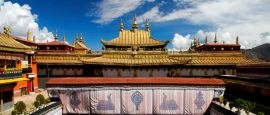Tibet History, Language and Culture
History of Tibet
The early Tibetan Empire was one of Asia's largest, even seizing the Chinese capital Xian in CE 763, before the arrival of Buddhism in the 8th and 9th centuries reshaped the nation's psyche, transforming it into one of the world's most spiritually advanced centres.
Up until the 20th century Tibet was essentially a medieval theocracy under the leadership of the reincarnated Dalai Lamas, where wealth, education and political power were vested in the hands of powerful monasteries.
During much of the 19th and early-20th centuries, Tibet cut itself off, retreating behind its Himalayan ramparts and closing the doors to foreign travellers, which was a policy that only added to its mystique.
The Communist Chinese invasion of Tibet in 1950, shattered this isolation, ushering in four decades of political upheaval. The litany of sorrows included the flight of the Dalai Lama in 1959, the destruction of thousands of monasteries and the detention of countless political prisoners, many of them monks and nuns.
Since the late 1980s many religious freedoms have returned although violent demonstrations rocked the region in 1987, 1989 and 2008 and the Chinese occupation of Tibet continues to be a contentious issue.
Today the economy is booming with more than two million tourists a year, most of them Chinese. The communist leadership points to huge investment in infrastructure, airports and the controversial railway line as proof of its commitment, but frustrated Tibetans lament the country’s mass immigration, limited employment and state interference in religious affairs.
Did you know?
• Butter tea, or po cha, is made from tealeaves, yak butter, water and salt.
• The Tibetan dzo is a hybrid of yak and domestic cattle, larger and stronger than both and more productive in milk and meat.
• Nangma dance music is popular in karaoke bars in Lhasa.




 You know where
You know where